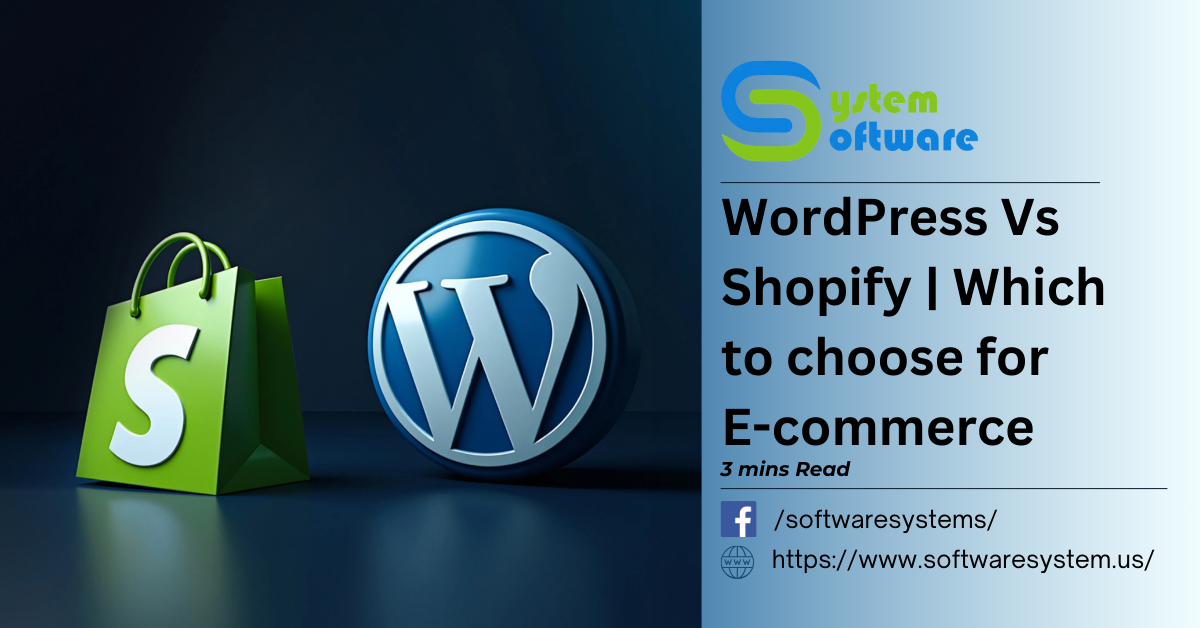Choosing between WordPress vs Shopify for your online store depends on your budget, business needs, and technical skills. Both platforms are widely used, but they offer different features and levels of customization.
This detailed side-by-side comparison at Software System, a technology services company, will help you determine which platform Shopify vs WordPress is the best fit for your e-commerce business.
WordPress vs Shopify Guide

Shopify vs WordPress: Key Differences
| Feature | Shopify | WordPress (WooCommerce) |
| Hosting | Fully hosted | Requires separate hosting |
| Ease of Use | Beginner-friendly, no coding required | Requires setup, technical knowledge helps |
| Customization | Limited to Shopify’s tools and apps | Highly customizable with plugins and code |
| Themes | 140+ themes (free & paid) | Thousands of free and premium themes |
| Ecommerce Features | Built-in shopping cart, secure checkout, POS integration | Requires WooCommerce plugin for ecommerce |
| SEO Control | Basic SEO options, limited technical control | Requires WooCommerce plugin for e-commerce |
| Multi-Channel Selling | Integrated with Facebook, Instagram, Amazon, etc. | Requires plugins for multi-channel sales |
| Cost | Monthly subscription | Hosting, domain, and plugin costs vary |
Why Choose Shopify?
Shopify is a fully hosted e-commerce platform designed for those who want a quick and easy store setup. It is ideal for small businesses, entrepreneurs, and those without technical expertise.
Key Benefits of Shopify:
- No hosting management – Shopify takes care of hosting, security, and updates.
- Step-by-step store setup – A guided wizard helps you launch your store quickly.
- Built-in e-commerce tools – Includes payment gateways, shipping options, and analytics.
- 24/7 customer support – Available via live chat, email, and phone.
- Seamless social selling – Easily integrate with TikTok, Instagram, Facebook, and Amazon.
See Shopify development and SEO services at Software System.
Why Choose WordPress (WooCommerce)?
WordPress is an open-source content management system that, when paired with WooCommerce, becomes a powerful e-commerce platform. It is ideal for businesses that want full control over design, SEO, and scalability.
Key Benefits of WordPress:
- Complete customization – Use thousands of WordPress plugins to enhance functionality.
- Control over hosting and costs – Choose a hosting provider based on your needs.
- Advanced SEO capabilities – Optimize site speed, structure, and content.
- Supports unlimited languages and currencies – Perfect for global businesses.
- Multisite feature – Manage multiple online stores under one account.
See WordPress Development and SEO services at software system.
Shopify vs WordPress for Ecommerce: Feature Comparison
1. Web Hosting
Shopify includes fully managed hosting, while WordPress requires third-party hosting. With Shopify, you don’t need to worry about server management, but with WordPress, you have more flexibility in choosing a hosting provider.
2. Store Setup & User Experience
Shopify provides a user-friendly interface with a setup guide, making it easier for beginners. WordPress requires the WooCommerce plugin, which offers flexibility but has a steeper learning curve.
3. Store Design & Themes
Shopify offers 140+ e-commerce themes, most of which are ready to use with minimal customization. WordPress has thousands of free and premium themes, but many require additional customization and page builders like Divi or Elementor.
4. E-commerce Features
Both platforms allow you to:
- Sell physical and digital products
- Offer custom shipping rates
- Set up secure payment gateways
- Run discounts and promotions
- Connect with POS systems
However, Shopify’s e-commerce functionality is built-in, while WordPress requires WooCommerce and additional plugins.
5. SEO Capabilities
- WordPress SEO advantages – Full control over technical SEO, site structure, and performance optimizations.
- Shopify SEO – Supports on-page SEO, but lacks advanced customization like server-side edits.
Both platforms allow you to:
✔ Write custom title tags & meta descriptions
✔ Optimize images with alt text
✔ Customize URL structures
WordPress users benefit from Yoast SEO and SEO-friendly hosting, while Shopify has limited control over technical SEO.
6. Multi-Channel Selling
Shopify makes it easier to sell on multiple platforms (Amazon, eBay, Instagram, Facebook, and TikTok) with built-in integrations. WordPress requires additional plugins for the same functionality.
7. Payment Gateways
Shopify supports 100+ payment gateways, including Shopify Payments, PayPal, and Stripe. WordPress supports many gateways, but some require extra plugin fees.
8. Security & GDPR Compliance
- Shopify automatically handles security updates and includes SSL encryption.
- WordPress requires manual security configurations but offers GDPR compliance plugins.
9. Mobile Optimization
- Shopify themes are all mobile-friendly.
- WordPress requires a responsive theme and potential mobile optimization plugins.
10. Customer Support
| Platform | Support Options |
| Shopify | 24/7 live chat, email, and phone support |
| WordPress | No official support relies on community forums and plugin developers |
Pricing: Shopify vs WordPress
| Expense | Shopify | WordPress (WooCommerce) |
| Platform Cost | Starts at $39/month | Free (WordPress.org) |
| Hosting | Included | Starts at $2.99/month |
| Domain Name | $14.95/year (via Shopify) | $10-$20/year |
| SSL Certificate | Included | Often included with hosting |
| Plugins & Apps | Free & paid apps available | Free & paid plugins available |
Shopify’s pricing is predictable, while WordPress costs vary based on hosting, themes, and plugins.
Final thoughts: Which Platform is Best?
| Best For | Choose Shopify If You: | Choose WordPress (WooCommerce) If You: |
| Ease of Use | Want a beginner-friendly solution | Have experience with web development |
| Customization | Prefer a streamlined approach | Want full control over design and functionality |
| SEO & Performance | Need basic SEO features | Want complete SEO and performance optimization |
| Scalability | Want built-in ecommerce tools | Need a flexible platform that grows with your business |
| Budget | Prefer predictable pricing | Want to control costs with different hosting plans |
Choose WordPress if:
✔ You need a highly customizable e-commerce site
✔ You want better SEO control and custom hosting
✔ You plan to run multiple stores under one account
Choose Shopify if:
✔ You want an all-in-one ecommerce platform with minimal setup
✔ You need integrated hosting and customer support
✔ You plan to sell across multiple sales channels easily
Conclusion
When comparing Shopify vs WordPress for e-commerce, Shopify is better for ease of use and quick store setup, while WordPress is ideal for advanced customization and SEO control. Your choice depends on how much control you need and how much time you’re willing to invest in setup and maintenance.
Would you like further insights on Shopify SEO vs WordPress SEO or help optimizing your e-commerce store? Let us know!
